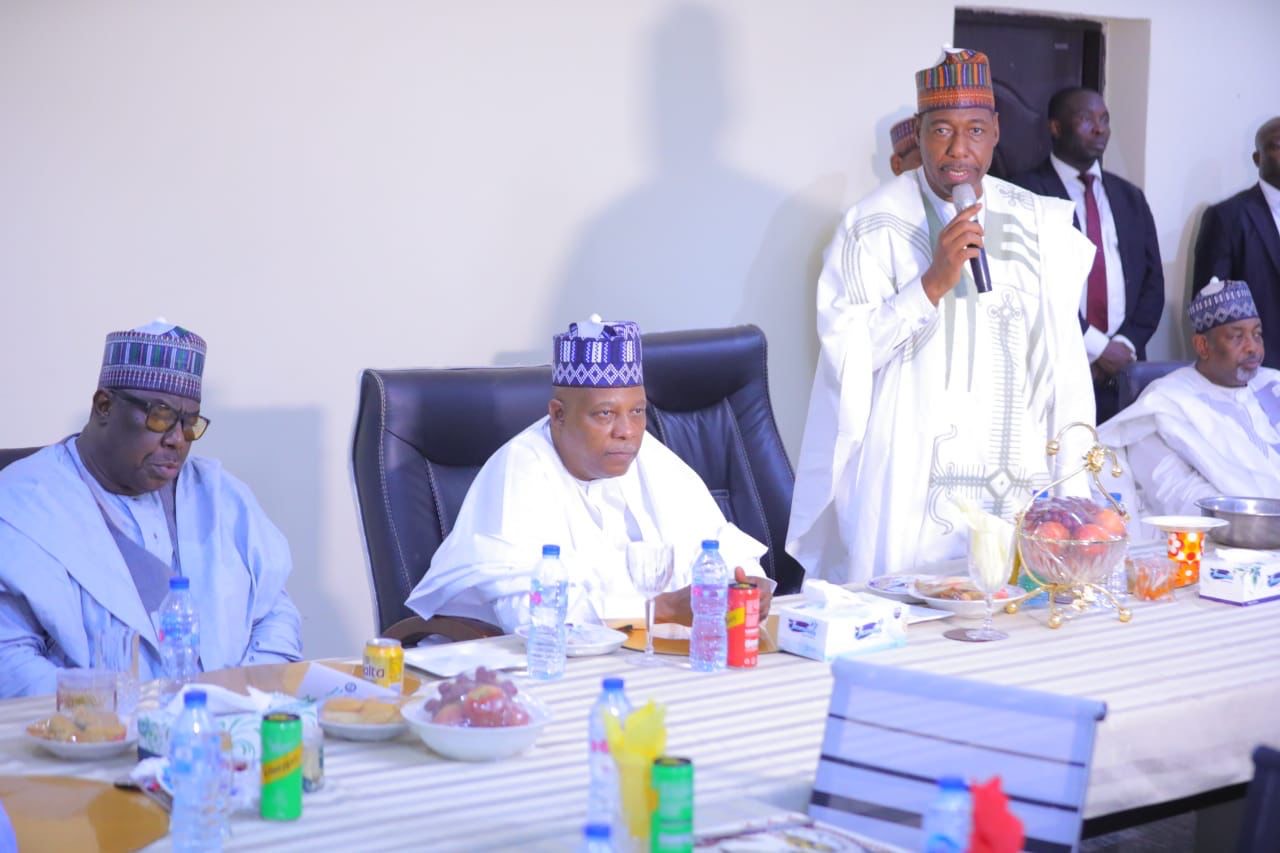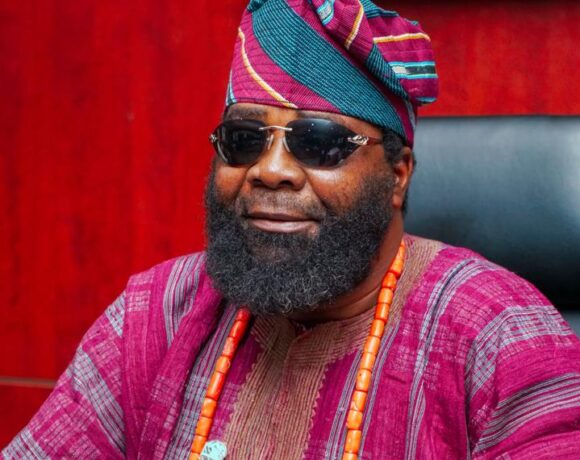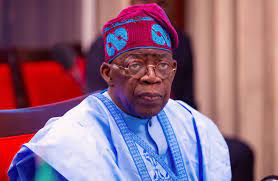Femi Gbajabiamila and what it means to be Chief of Staff to the president

The news of the appointment of Femi Gbajabiamila, the outgoing Speaker of the House of Representatives, as the incoming Chief of Staff to President Bola Ahmed Tinubu was greeted with much excitement. But what is the job of a chief of staff, and why is it so important? In this piece, we republish an article with the title: “The power of the office of chief of staff” written by Mr Eric Teniola in 2019. It provides an insight into the history and functions of the chief of staff.
It runs thus:
The office of the Chief of Staff to the President as we all know, was not created by the constitution. Today, after twenty years, the office is one of the most envied in the land. The office plays two roles, Bureaucratic as well as Political. It is the abuse of the political role that has brought the attraction.
President Olusegun Obasanjo created that office for the first time in 1999 to follow the American pattern. The 36 states followed President Obasanjo’s example. Hitherto, the present assignment of responsibilities of that office were done by the Secretary to the Government of the Federation as well as the Principal Secretary to the Head of State.
The office of Principal Secretary to the Head of State came with the British. The first person to hold that office was Sir Peter Hyla Gowne Stallard (1915-1995) who joined the British Colonial Office in 1937. The then Prime Minister, Tafawa Balewa (1924-1966) appointed him after serving as the administrative Secretary of the London Constitution Conference.
He later became the joint clerk for the House of Chiefs and the House of Assembly of Northern Nigeria. After serving as Principal Secretary, Mr. Peter Stallard was posted as Lieutenant Governor of Honduras in 1961. He later handed over to Mr. Stanley Olabode Wey from Lagos.
The chairman of the 10th year independence anniversary committee in 1970, who was also deputy Permanent Secretary during the era of Tafawa Balewa in the CABINET OFFICE, Mr. Benjamin Akinnusi Osunsade (93) from Idanre in Ondo state told me last week that the office was too tasking to the extent that Mr. Wey found the job very frustrating. Mr. Osunsade added in his Isolo Mushin house that the system was working perfectly until the military came. According to him “the military ruined the civil service and destroyed the country as well”. Eventually, Mr. Wey became the Secretary to the Federal Government.

During the era of General Aguiyi Ironsi, the Principal Secretary was Mr. Abdul Kareem Disu (1912-2000) from Isale Eko, Lagos. He was the best friend of Dr Nnamdi Azikiwe, the first President of Nigeria as well as Chief Press Secretary. Mr. Disu married an Nnewi woman, Rose Asomugha from Anambra state. During their marriage a veteran journalist Chief Melie Chukelu Kafu Ajuluchukwu (1924-2003) was their best man.
During the tenure of General Yakubu Gowon, the Principal Secretary was Ufot Ekaette from Ikot-Edor in Onna local Government of Akwa-Ibom state. During the era of General Ibrahim Babangida, he was appointed deputy governor of Akwa Ibom state. He later became Secretary to the Government of the federation under President Olusegun Obasanjo. During the tenure of Generals Murtala Muhammed and Obasanjo, the Principal Secretary was Muhammed Arzika from Tambuwal in Sokoto state. He later became General Manager Sokoto Rima Basin Authority.
Under President Obasanjo, Arzika was appointed Minister of Communications.
During his tenure as Principal Secretary he was assisted by Mr. Albert Pius Omotayo from Igbara Odo in Ekiti state and Mr. Lamine Okion Ojigbo from Aladja in Delta state. Mr. Omotayo later became Nigeria’s Ambassador to Mozambique under President Obasanjo while Mr. Ojigbo is now an Author.
Under President Shehu Usman Aliyu Shagari (25 February, 1925 -28 December, 2018),the Principal Secretary was Mr. Godwin Edward Michael Prest from Onitsha in Anambra state. Mr. Prest a lawyer/journalist had earlier worked in the British library in Lagos. During the tenure of General Muhammadu Buhari,the Principal Secretary was Abubakar Mamu from Borno state who now lives in Karu in Abuja. Alhaji Mamu before his retirement, rose to become Permanent Secretary Ministry of Power and Steel.
Mamu had earlier worked with Colonel Buhari in Maiduguri when he was Governor in North East in 1976. He was assisted by Muhammed Musiliu Tanko from Sokoto state. Alhaji Tanko who speaks Yoruba fluently had served under the former Vice –President, Dr. Alex Ekwueme. As Chief Secretary, he also served Major General Tunde Idiagbon when he was Chief of Staff, General Headquarters between 1984 and 1985.
Before his retirement, Alhaji Tanko was a Director in Federal Ministry of Finance.
During the tenure of General Ibrahim Babangida, the Principal Secretary then was, Mr. Hamid Wathanafa from Borno state. The same arrangement existed during the era of Chief Earnest Adegunle Shonekan. During the tenure of General Sanni Abacha, there were two Principal Secretaries that served under him—Ibrahim Seriki and Usman Jiidah Shuwa.
When General Abdusalam Abubakar came to power he appointed, Sadiq Mahmud as Principal Secretary and the pioneer Military Governor of Osun state, Major General Segun Leo Ajiborisha as Principal Staff Officer. General Ajiborisha is from the famous Onimole family in Isale-Eko,Lagos as well as Olorogun Adodo family also in Isale-Eko,Lagos. He lives quietly in his Apapa residence now. All these officers were assisted by bureaucrats including
Mallam Y. Abba, M.I. Abdullahi, A.A. Gumi,A. Sulayman, A.A. Esho, M.I. Sulaiman and M.I. Okafor.
Othersin the VILLA at that time were Musa Aduak,J.O. Abuah, S.M. Katsina, Professor A.H. Yadudu, H.A. Tahir, M.D. Sanka, S.Y Hammah,A.S. Aladeloba, H. D. Abbas, I.B. Imanah, N.O. Odumade,Mr. S.L. Wakawa,Malam Mamman Nasir,Dr M.A. Idah, Mr. B. Amodu,Mrs. A.M. Ahmed,Dr. S. Sanusi, Dr. I.A. Aluko,Mrs. M.U. Sanisi, Ambassador A.E.H. Emenyi, G.O. Akanbi,M.O. Shoaga, C.G. Uzomah,B.E. Iheasirim,O.O. Oyelakin,G.A. Sobajo, I.G. Kura(Alhaji),M.F. Aiyegbusi,B.E. Abiara, Mrs Rosemary Ezeugoh,Mr. James Osasere Enabu and Adebisi Oguniyi, from Osun state, the doyen of the VILLA ,having served longer than anyone at the then state house Abuja and at Dodan Barracks, Lagos.
In fact the finance in the VILLA before 1996 was directly under the office of the Secretary to the Government of the Federation, administered by Baba Farouk, who was then Director of Finance and supply. Alhaji Baba Farouk who later became Permanent Secretary, Ministry of Water Resources recently succeeded his father as the Emir of Katagum in Bauchi state.
It was President Olusegun Obasanjo who created the office of the Chief of Staff and appointed the former Military Governor of Benue/Plateau state and former National Security Adviser, Major General Abdullahi Muhammed, the Managing Director of Toto Press, in Ilorin, to that post with Ambassador Aderemi Olagoke Esan as his deputy. He also appointed S. Mamud as Private Secretary to President Obasanjo. In addition, he made Mr. Steve Osagiede Oronsaye (68) from Edo state as Principal Secretary. When President Obasanjo in 1999 created that office, he wanted the Chief of staff to be the head of his domestic staff. A sort of a book maker or scheduled officer who oversees his appointments and meetings like an AJIROBA, whom the Yorubas calls the fellow who first sees the king in office. He copied the American system. Even in America where the office first originated it was in 1946 that the office was normalized and it acquired its current title in 1961.
When President Obasanjo in 1999 created that office, he wanted the Chief of staff to be the head of his domestic staff
The Americans labelled the office as “GATEKEEPER”. I remember President Obasanjo instructed the then Secretary of the Government of the federation, Chief Ufot Ekaette to draw for his approval in June 1999 the schedule of the office of the Chief of Staff. I remember the first draft of that scheduled was drafted by Ekaette’s top aide at that time, Dr. Goke Adegoroye and Chief Phillip Chikwuedo Asiodu, “a super Permanent Secretary” during the era of General Yakubu Gowon, who was at that time the Chief Economic Adviser of the Federal Government. The leakage of the schedule that was published in the Nigerian Tribune and the Guardian (Martins Oloja), almost put me into trouble. Since that time till now the office has blossomed.
When President Obasanjo introduced the office in 1999 he later approved the following as special advisers/special assistants—Bodunde Adeyanju, Chief Phillip Asiodu, Amb. Raph Uwechue, Prof. Julius Ihonbere, Amb. E.A. Azikiwe, Dr Oby Obiageli Ezekwesili, Mahmoud Waziri, Mrs. T. Ajanaku, Chief S.K. Babalola, Prof Ango Abdullahi, Dr. Patrick Dele Cole, Dr. Rilwanu Lukman, Alhaji Aminu Wali, Sen. L. Imoke, Prof. A.B.C. Nwosu, Dr.Stanley Macebuh, Alhaji Ibrahim Imam, Dr. Mrs. E. Uduehi, Onyeama Ugochukwu, Dt. Ibrahim Y. Lame, Adamu Maina Waziri,Dr.(Mrs.) Catherine Acholonu, Dr. Maxwell Gidado, Dr. Bukola Saraki, Handel Okoli, Stephen Akiga, Dr. Andy Uba, Mrs J.O. Ayo and Tunde Olusule.
He appointed the following as special advisers/special assistants to the office of the Vice-President, Shola Akanmode, Abdullahi Nyako, Chris Mamah, Mahmoud Abdullahi, Sajo Mohammed, Professor A.B. Aborishade, Dr. Usman Bugaje, Dr. Hamilton Isu, Dr Adeola Akande, Mr. Onukaba Adinoyi Ojo, Tokunbo Ayenuga, Umar Ardo, Ajuji Ahmed, John Agwu and A.A. Achibong,
The only President who did not appoint Chief of Staff was President Umaru Musa Yar’dua (1951-2010) whose tenure was between 2007 and 2010. Instead he appointed on the recommendation of the former Governor of Delta, James Ibori, the then Delta state Commissioner of Finance, Olorogun David Edevbie as Principal Secretary.He married an Ile-Oluji lady in Ondo state in 2002. Under the working zoning arrangement in Delta state, Mr. Edevbie is slated to be Governor of Delta state in 2023. His brother Matthew is a billionaire and they are from Afiesere in Ughelli North local government area of Delta state. The governor of Delta state, Senator Ifeanyi Arthur Okowa, “the road Master General” recently appointed Olorogun David Edevbie as his Chief of Staff.
When President Obasanjo left in 2007, he wanted Major General Abdulahi to be retained as Chief of Staff, but the powerful men from Katsina state resisted. People like Dr. Tanimu Yakubu Kurfi, the then Minister of Agriculture and Water Resources, Abba Suyyad Ruma, Shehu Inuwa Imam, the CSO, Yusuf Tilde and the ADC, Colonel Mustapha Onovieda encroached on that office and in the end, Major General Abdullahi left the villa in June 2008. The situation became confused at that time and no one could possibly say who was really in charge. In the end President Yar’dua scrapped the office of Chief of Staff and sacked all the special assistants of President Obasanjo. Those affected include, Dr. Gbolade Osinowo, who was initially the Senior Special Assistant on Political Affairs to the President; Dr. Emmanuel Egbogah, Deaconess J.O. Ayo, Senior Special Assistant on Economic Affairs; and Princess Gloria Nweka, Senior Special Assistant on Presidential Matters.
The situation continued during the illness of President Yar’dua and his sad death on May 5, 2010. Since then every President has appointed Chief of Staff.
In May 2010, President Goodluck Jonathan appointed his friend and deputy governor colleague, Chief Mike Aiyegbeni Oghiadomhe from Fugar in Etsako Central Local Government Area of Edo state as Chief of Staff. On February 8, 2014, President Goodluck replaced Chief Oghiadomhe with Brigadier General (rtd.) Jones Oladeinde Arogbofa (66) as Chief of Staff. Brigadier Arogbofa, who is from Oka in Akoko South Local Government Area of Ondo state was former Military assistant to Brigadier General (rtd) Raji Rasaki, former Military Governor of Lagos state.
The present Chief of Staff, Mr. Abba Kyari was appointed by President Muhammadu Buhari on August 27, 2015. He is a product of University of Cambridge, University of Warwick, Nigerian Law School, International Institute for Management at Laussane, Switzerland and Harvard Business School. From 1988 to 1990, he was Editor with the New Africa Holdings Limited Kaduna. In 1990 he served as Commissioner for Forestry and Animal Resources in Borno State. From 1990 to 1995, Kyari was Secretary to the Board of African International Bank Limited. Abba Kyari was Executive Director, Management Services, United Bank for Africa Plc. (UBA) and was later appointed Managing Director and Chief Executive of the Bank. He was appointed a Director of Unilever Nigeria Plc. In 2002 and is a Director of Exxon Mobil Nigeria. In addition to his appointment as Chief of Staff to the President, Mr Abba Kyari was appointed to the board of Nigerian National Petroleum Corporation by President Muhammadu Buhari on July 4, 2016.
The growth of the power and influence of the office of Chief of Staff depends on the President. Only the President can decide the relevance of that office and powerful it could be. He is the one and the only one who can delegate authorities and power to that office. For all powers flow directly from him.
Lets take a look of the scheduled of the office as at 1999.
RESPONSIBILITIES OF THE CHIEF OF STAFF are
1- Coordinating the activities of all Principal Staff Officers of the President C-IN-C,
2- Conveyance of all directives and decisions of the President, C-in-C to the SGF, CDS. Members and other top functionaries of Government,
3- formation of ad-hoc bodies as well as stipulating their terms of reference in conjunction with SGF,
4- Chairing of meetings of Principal Staff Officers to the President, C-in-C,
5-Monitoring and Coordinating the day to day activities of the President, C-in-C, 6- Clearance of all official military and civil matters as well as preparation of executives summaries on official issues, 7- Arrangement of all official appointments and engagements of the President, in conjunction with SCOP and ADC to C-in-C,
8- Arrangement and convening of all meetings sanctioned by the President C-in-C as well as coverage of such meetings including provision of secretariat services,
9- organizing Federal Executives Council meetings in conjunction with the cabinet secretariat and advising the President, C-in-C on schedules of the meetings to approval and eventual communication of same by the COS to the Cabinet Secretariat,
10.- attendance of National Defence and Security Council meetings,
11. Coordination and attendance of the annual council/boards of Defence, NA, NN, NAF, NWC, CSC, NDA and NDF as well as following up all decisions reached at the meetings
12. Serving as a link between the President, C-in-C and the Service Headquarters,
13. Vetting of all draft speeches for the President, C-in-C in respect of services functions
14. Management of correspondence to and from the President, C-in-C including the circulation of enrolled legislation, proposed Executive orders, decision memoranda, speeches and other Presidential documents to relevant State House functionaries for clearance and comment.
15. Ensuring that any document being forwarded to the President, C-in-C is in suitable condition, technically and substantively for President review and action,
16—maintenance and control of the President, C-in-C’s projects and welfare accounts,
17—authorisation of use of Presidential Air-fleet by Government functionaries.
Teniola, former director at the presidency wrote from Lagos.
The Insight Report
Nigeria Coverage



